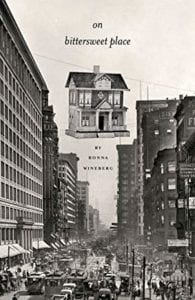
Winner of the 2016 Shelf Unbound Competition for Best Independently Published Book
Wineberg’s coming-of-age story of Lena Czernitski, a young Russian Jew who has fled the Ukraine with her family to brave the challenges of assimilation in 1920’s Chicago, has all the elements of a classic. It is a lovely novel with a heroine of depth, intelligence, and tremendous heart.
Shelf Unbound: How did the idea for this novel come about?
Ronna Wineberg: The seed for the book came from my family history. My mother’s family fled from Russia. Though she and my father were born in the United States, many of our relatives had come from Russia. As a child, I didn’t know much about the family background. When I was in college, some cousins of mine and I decided to talk to our grandparents and aunts and uncles about life in Russia. We all sat in the living room of my parent’s home and asked questions. I was riveted by the stories. My great grandfather was murdered by Cossacks but not in the way that occurs in the book. I thought then that someday I’d like to write about an immigrant family. But when I began to write fiction, I wrote stories about contemporary life. Eventually, I decided to write a series of linked short stories about a Russian girl and her family. After I had written a few stories, I realized I was writing a novel. The Russian portions of On Bittersweet Place are loosely based on my family’s history.
Shelf Unbound: You have rendered a complex and memorable character in Lena. How did you go about creating her?
Wineberg: Thank you. At first, I experimented with different voices for the narrator and different points of view. When I discovered Lena’s voice, she led me through the novel. Things happened in the book that I didn’t expect. Lena evolved as I wrote and as I revised; she became a stronger character. The key for me was finding her voice on the page and her internal voice. Sometimes I read sections aloud to be sure they sounded like her.
Shelf Unbound: You cover a lot of weighty topics in this novel: prejudice, sexual abuse, mental illness, death, infidelity, class. Yet you weave them into the story so seamlessly that the book never feels heavy handed. Why did you want to include all of these topics and what was your approach to doing so?
Wineberg: The topics arose as I wrote. When I created Lena and her family, I knew that one family member would suffer from mental illness. The sexual abuse arose in the course of writing. I wanted to capture Uncle Maurice’s essence as a person—what he does in the book seemed to describe who he is, his character. It’s also a burden Lena has to carry. After I finished a draft of the book, I realized there were a lot weighty topics in the pages and that Lena faced many challenges. But I felt this was realistic for the era and for a child in a struggling immigrant family.
Shelf Unbound: What kind of research did you do to so effectively portray Chicago in the 1920s?
Wineberg: I grew up in Chicago and am familiar with the landscape of the city and the lake. I visited Chicago while writing the book, drove around and walked in the area where Lena lives. I didn’t know much about the city in the 1920s and had to do a lot research, which I enjoyed. I read books about popular culture in the 1920s. I learned about music, fashion, jewelry, books, prices of products, schools, sexual mores. I read about daily life in the United States in the 1920s and read Irving Cutler’s The Jews of Chicago. The Encyclopedia of Chicago was very helpful. And I read about American, Russian, and world history before and after World War I. I did research on the Internet and spoke to librarians at the Chicago Public Library who found names of Chicago streets in the 1920s, weather patterns, streetcar routes, and other information about the city. I did research before I wrote the book and while I was writing and revising. It was important for the details in the novel to be accurate.
Shelf Unbound: You write in your acknowledgements that your grandparents and other relatives fled Russia, arriving as immigrants at Ellis Island. What does it mean to you personally to have written this novel?
Wineberg: I wanted to capture the warmth, tension, and difficulties of a family and portray what it was like to be a Jewish immigrant in the Midwest during a time of prejudice. The book is a way to honor my grandparents and other relatives, to bring back to life their world as they may have experienced it, to imagine that world. The novel is fiction, but I wanted to make the emotion in the book true. Writing the book also helped me reconstruct what it feels like to be a teenager, part of a family yet trying to break away, a piece of my life that is long past. I’m grateful that Relegation Books and its extraordinary publishing team believed in the book and took such good care of it. And I’m happy the novel speaks to you and other readers.
